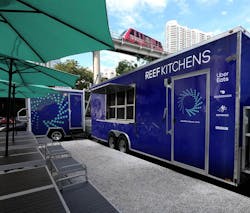REEF Technology wants to turn parking facilities into urban mobility hubs
With the rise of the on-demand economy, the need for parking lots and garages to be a space for nothing more than storing vehicles is beginning to wane. But instead of trying to phase parking lots and garages out completely, REEF Technology, the largest parking network in North America, has unveiled plans to adapt these spaces into tech-forward, urban mobility hubs to deliver on-demand goods and services.
The company, which is supported by SoftBank Vision Fund and Mubadala Investment Company, plans to leverage the high-density, high-activity location of its parking lots and parking structures to create a robust ecosystem to connect people to the goods and services they want.
See Also: Earthquake response system takes the guesswork out of seismic safety
A key component of these logistics hubs is the last-block, delivery-only REEF Kitchens. Restaurants can partner with REEF Kitchens to open and expand their businesses while also providing more food options and faster delivery at a lower cost to customers. The centralized location of the REEF hubs will help extend the reach of restaurants without burdening the restaurants’ main kitchen. Additionally, REEF has partnered with delivery services such as Uber Eats, DoorDash, Postmates, and Grubhub, with couriers on site so deliveries will reach customers more quickly and fresher than before.
The kitchens are housed in proprietary containers capable of accommodating one to five restaurant brands or concepts. Restaurants can run operations directly on contract with REEF to stage and prepare delivery-only menu items. REEF Kitchens have successfully launched in Miami and London, with plans to open several hundred more in North America and the U.K.
REEF has also partnered with electric bike and scooter rental companies, on-demand aviation businesses, and peer-to-peer car rentals. Rideshare car buffering zones, where drivers can access services like car detailing and maintenance, will exist within the hub.
REEF claims that its urban mobility hub concept will future-proof its parking structures, while also addressing many of the major obstacles all cities face: congestion, pollution, high costs for businesses to expand, and residents’ growing desire for their goods and services to be delivered quickly.
Not bad for something that, in the past, was just a flat piece of asphalt or concrete for housing vehicles.

